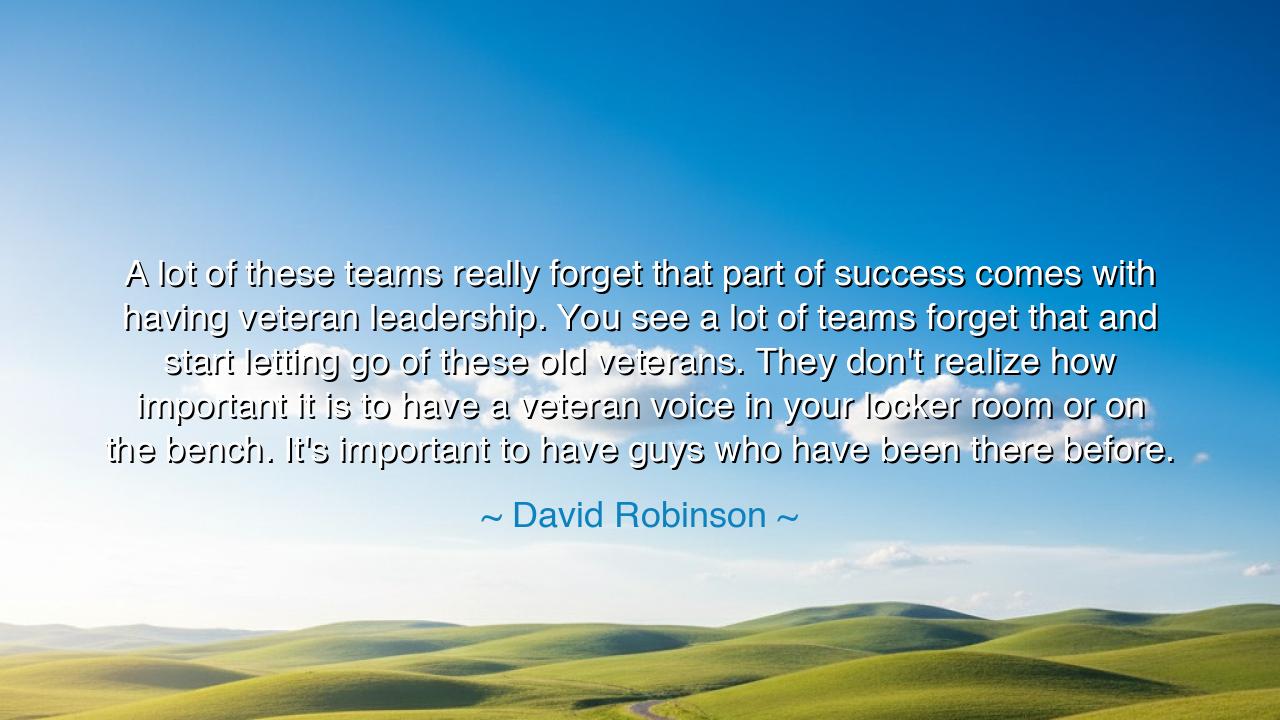
A lot of these teams really forget that part of success comes
A lot of these teams really forget that part of success comes with having veteran leadership. You see a lot of teams forget that and start letting go of these old veterans. They don't realize how important it is to have a veteran voice in your locker room or on the bench. It's important to have guys who have been there before.






Hear the words of David Robinson, “The Admiral,” a man of discipline and honor, who declared: “A lot of these teams really forget that part of success comes with having veteran leadership. You see a lot of teams forget that and start letting go of these old veterans. They don’t realize how important it is to have a veteran voice in your locker room or on the bench. It’s important to have guys who have been there before.” This is not merely about the game of basketball, but about the eternal laws of wisdom, experience, and guidance. For youth carries energy, but age carries perspective; victory demands both.
The ancients themselves treasured this truth. In the councils of kings, it was the grey-haired elder who tempered the passion of the young warrior. In the Roman Senate, the voice of seasoned statesmen guided rash ambition into steady triumph. For the elders bore scars, and in those scars lived the knowledge of survival. Robinson reminds us that every team, every community, every nation needs such veteran leadership—not because the elder runs the fastest, but because he knows which path avoids destruction.
Consider the story of Robinson himself. In his final years with the San Antonio Spurs, his scoring and minutes declined. Yet alongside him rose Tim Duncan, young and strong, destined to be one of the greatest. Duncan’s rise was not hindered by Robinson’s presence—it was guided by it. The younger star learned not only skills of the game, but habits of humility, discipline, and service. Together, old and young, they built a dynasty. Robinson’s words reflect his own life: the veteran voice is the anchor that steadies the ship when storms rise.
History offers another mirror. In the Second World War, many of the generals who commanded victory were not young men. Eisenhower, Montgomery, Zhukov—each carried years of experience, drawn from earlier conflicts. The young soldiers had courage and fire, but it was the veteran leadership that gave their courage direction. Without that steady hand, courage becomes chaos, and strength becomes waste. Robinson’s warning is the same: do not discard the wisdom of those who have “been there before.”
But too often, as Robinson laments, the world worships youth and forgets the value of age. Teams, companies, even nations cast aside the old in search of something faster, newer, brighter. Yet in doing so, they weaken their own foundations. For when storms come—and storms always come—it is the veteran who remembers how to endure, who can calm the restless, who can remind the young that trials are not the end, but the forge of greatness.
The meaning of Robinson’s words, then, is clear: success is not built only on raw talent, but on the blending of strength and wisdom, energy and experience. To forget this is to build a house without pillars, strong for a season but certain to collapse. To honor this is to create a legacy, where each generation lifts the next, and the voice of the seasoned guides the fire of the new.
The lesson is this: in your own life, treasure those who have walked before you. Seek their counsel, honor their scars, listen to their stories. And when your time comes to be the veteran, do not withdraw into silence—speak, guide, encourage, and steady those who come after. In teams, in families, in communities, greatness is never the work of one generation alone, but of many, bound together by respect and remembrance. For as Robinson teaches, it is important to have guys who have been there before—for they hold the map of survival, and through them, victory is secured.






AAdministratorAdministrator
Welcome, honored guests. Please leave a comment, we will respond soon